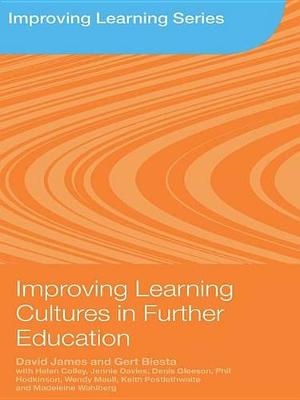Improving Learning
3 total works
Improving Learning Through the Lifecourse
by Gert Biesta, John Field, Phil Hodkinson, Flora J MacLeod, and Ivor F. Goodson
Adult learning matters. There is now widespread agreement that modern countries depend on the creativity, skills and knowledge of the entire population for their prosperity. Many people talk of our future well-being in terms of a `knowledge economy' or a `learning society' in which every person's ability to develop new capabilities will provide them with resources that will help them and the wider community to adapt and thrive. While in theory this makes lifelong learning into an exciting prospect, in practice this broad agenda is often reduced to a narrowly economic conception.
This book reports on one of the largest research projects into lifelong learning conducted in recent years. Through over 500 in-depth interviews with a cohort of about 120 adults who were followed for three years, the Learning Lives project has built up a detailed understanding of what learning means and does in the lives of adults. The project has generated insights in how learning has changed over time and across generations, what the connections are with the changing world of work, what differences learning makes for life chances, how we can learn from life and for life, and how people's prospects of learning can be improved. Combining life history and life-course research with analysis of longitudinal survey data, this book provides important insights into the learning biographies and trajectories of adults.
The book shows that learning means and does much more in people's lives than is often acknowledged by current education policy and politics. In doing so, it is an invaluable resource for anyone with an interest in the role and potential of learning through the lifecourse.
Improving Learning Through the Lifecourse: Learning Lives
by Gert Biesta, Phil Hodkinson, Flora J MacLeod, Ivor F. Goodson, and John Field
Improving Learning Cultures in Further Education
by David James and Gert Biesta
Through its unique theoretical framework - a cultural understanding of teaching and learning – this book develops a new way of understanding educational improvement, one which focuses on the formation and transformation of the practices through which students learn. Based on detailed ethnographic research of seventeen learning sites in further education colleges, this book generates a unique insight into a wide variety of practices of teaching and learning. Illustrated by case studies, it is structured around three key questions:
- what do learning cultures in FE look like and how do they transform over time?
- how do learning cultures transform people?
- how can people (tutors, managers, policy makers, but also students) transform learning cultures for the better?
Through a combination of theory and analysis, Improving Learning Cultures in Further Education makes a strong case for the importance of a cultural approach to the improvement of teaching and learning in further education, and provides practical guidance for researchers, policymakers and practitioners for implementing change for the better.

